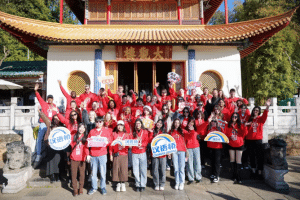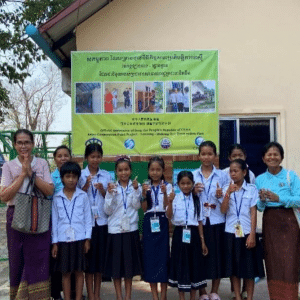Introduction: CDB’s editors post their thoughts on the series of scandals in the charitable, public welfare sector last year and how the sector should respond in this age of media and social media hype.
This past year, the hottest topic to come out of the public welfare sector was undoubtedly Guo Meimei, a young, attractive girl who posted to a microblog about her extravagant lifestyle. The Chinese Red Cross and even the entire charity sector came under fire for being associated with her. In contrast, the fallout was far less from previous controversies, like the exorbitant prices that the Red Cross charged for tents after the 2008 earthquake or media scrutiny of the quality of projects pledged by Chinese tycoon Chen Guangbiao earlier this year. The amount of donations dropped sharply as a consequence of the Guo Meimei incident, and soon thereafter, the Ministry of Civil Affairs issued a set of Guidelines for the Disclosure of Information on Charitable Contributions.News of Guo Meimei spread from the microblogs to other media quickly and soon became the talk of the town. A friend of mine, who knew very little about the charity sector, said to me after learning it was my line of work: “You’re all infamous now.” The power of microblogging as well as other forms of new media cannot be underestimated. When petitioning, self-immolations, forced demolitions and financial scandals fail even to elicit a strong reaction from readers, media reporters start asking: What scandals in the charity sector can we dig up? Their focus shifted to philanthropy, gradually turning it into a “goldmine” for scandals. After Guo Meimei, there was the Henan Soong Ching Ling Foundation, Lu Xingyu, and the Gesanghua membership scam, making 2011 a “Year of Scandals” for philanthropy in China. This year, the charity sector has really become the main subject of scandals. The participation of netizens, celebrities and pundits have been in the forefront of shaping public opinion and promoting deeper discussion of the topic.
However, scandals have a positive role to play in driving social change, which involves more than just exposing ugly truths. For some advocacy projects, finding and exposing scandals is an effective strategy. In the 1970s, Western-style investigative reporting, which focused on “muckraking”, became popular and could be quite damaging. In the era of mass media, particularly with microblogging becoming a key medium, everyone can be a media source and publish their own news. After being reposted by millions of microbloggers, news on the microblogs will greatly outpace conventional media. The “human flesh search” phenomenon on the internet comes to mind, where the public’s participation was fueled on by both truth and lies, reason as well as fanaticism.Time and time again, the public welfare sector has come under fire and met with strong public responses and a relentless media campaign, but there were also voices of reason among them. “Breaking Out of the ‘Inner Circle’, Embracing a New Era of Public Welfare,” published in this volume of CDB, presents different opinions of experts and leaders in this field. Kang Xiaoguang, a well-known scholar, sees this as the dawn of a new era in which the Internet is rapidly changing the power balance between the government and Chinese society. At the same time, a real public opinion is emerging due to growing public empowerment. Yang Tuan, who has devoted many years to the cause of public welfare, admitted that there are inner circles here just as in many other sectors. She made an enthusiastic appeal for abandoning these inner circles and embracing this new era.Leaders in this sector hope that enhancing the transparency and credibility of foundations will set an example for the industry as a whole. This is not only industry self-regulation, but also a form of self-help.
Merely resolving the trust crisis is not enough, however; there needs to be more of a long-term initiative to promote industry self-awareness. Public welfare in China currently exists in a fragmented and divided state. The industry is characterized by great variation in the amount of resources and stage of development. The Guo Meimei incident galvanized the community and provided a basis for discussion. However, the incident was not unique and failed to set a precedent for most grassroots organizations. With the growing popularity of muckraking, grassroots organizations that have a weaker base of support have been more likely to fall prey to media sensationalism and uncertainty. Grassroots organizations had doubts about the Gesanghua membership fraud reporting, but few further actions have been taken. On September 13, there was a discussion of “whether charitable donations merit tax deductions” on the popular Tencent microblog. It featured two experts, who microbloggers deemed by all accounts to be novices.
This discussion was just a “warm up” for the forthcoming China Charity 100 Forum. Experts portray it as a discussion of practical, operational considerations, aimed at promoting a culture of charitable giving and encouraging individuals to educate themselves about their rights and interests. At the same time, this inadvertently touches on grassroots organizations, most of which are still not eligible to issue tax-deductible receipts. An all-around understanding of philanthropy is needed; we, in fact, often focus on some parts at the expense of others.At the moment when we are caught in a deluge of opinions that range from the useful to the superfluous, emotion-ridden to logical, constructive to destructive, people often give hurried responses or are content with being onlookers as long as the fire does not reach them. This calls to mind the discussion raised by Li Chengpeng and Cheng Danqing of whether the “Human Flesh Search” for Guo Meimei is a legacy left over from the Cultural Revolution. Although we are pleased to see such a bottom-up process, we should ask ourselves: How many of us have adopted the attitudes of onlookers? Is a search like this constructive and rational? How much have mindsets changed since the Cultural Revolution and even earlier periods? Has the Internet turned us into real citizens? Have the tragic and disorienting effects of the Cultural Revolution, as Chen Danqing mentioned, really left us?Before we embrace this digital era, we need to be wary of and have a clear understanding of the vulnerability of public welfare organizations’ voices in this age of new media, and the limitations of China’s public welfare organizations’ development in this stage. Only in this way, amid the noise and chaos of a changing world, can we carefully cultivate and safeguard the achievements accumulated in the past two decades of civil society development.



